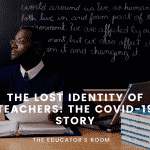Have you signed up for The Educator’s Room Daily Newsletter? Click here and support independent journalism!
I am approaching eight months since my last day as a teacher. I miss the excitement, joy, and challenges of working with young people. But, I’d be lying if I said I have any second thoughts about my decision to leave the classroom. The farther away I get from my time as a teacher, the clearer this decision becomes. The truth is, even before the pandemic, teaching was never sustainable.
The more I reflect on this truth, the angrier I feel, because I love teaching so much. And I really wish it was possible to keep doing it without feeling like I’m sacrificing my mental health.
Teaching Before COVID
I was already nearing burnout before COVID. And I wasn’t alone. From 2016 – 2020 I taught in one of New York City’s most under-resourced schools. It was a small school. Our 200-ish students were funny, creative, and eager to form connections with their peers and teachers. Many students also struggled with trauma related to housing insecurity, food insecurity, and violence in their homes and/or community.
Our school had one guidance counselor, and also a team of social workers through a specially funded partnership with a community-based organization. It was the best ratio of mental health providers to students that I have ever experienced, and it still wasn’t enough. I struggled with the effects of secondary trauma. I felt exhausted and persistently unsuccessful.
My time at this school crystallized for me the need for much higher funding of public schools, particularly schools in historically marginalized communities. I also found new clarity about the ways systemic oppressions affect communities, children, and teachers in schools across the United States.
This school was also under intense pressure by the district, city, and state to improve academic outcomes for our students. We received competing mandates from various office. There was a consistent implicit threat: raise scores or face closure. As a result, the curriculum I taught became increasingly narrow. Right before the pandemic hit, I was told to pause our curriculum and start teaching students using previous state test questions. It was the lowest point in my career. I considered quitting in protest. I knew this approach would be ineffective to raise scores, but more importantly it would deprive our students of their right to a rich, engaging, balanced education.
Teaching During COVID
My experience at this school represents a more extreme case, but it is not entirely aytpical. This was the reality of teaching before COVID: chronic under-funding, an exhausting workload, and the strain of systemic oppressions on ourselves and our students. In many cases, like mine, schools become dehumanizing sites of oppression. I have friends who taught at private schools who also felt a pressure to produce academic results which crowded out the time and space needed to form healthy classroom communities.
Since COVID hit, teachers continue to deal with all of the above, but with the additional pandemic stressors. Teachers are struggling to enforce mask requirements (where they exist). They’re doing their best to keep theirselves and their students safe from the virus. Meanwhile, they’re carrying the emotional burden of almost 1 million deaths; deaths that are concentrated in historically marginalized communities. These same communities were already hard to teach in. The relief bill that passed last spring included billions for public schools, but somehow it hasn’t materialized into better ventilation, more mental health services, or PPE. As before, teachers are filling in the gaps of our country’s woefully fractured social safety net. Those fractures have only gotten wider.
Why is Teaching in the U.S. Like This?
We all agree that education is valuable. Therefore we should value teachers too. In high performing school systems across the world teachers have one or more of the following: more status, higher pay, more opportunities for collaboration, for time for non-instructional tasks, and high quality and consistent mentoring and professional development. The countries with these systems often have social safety nets that provide a better quality of life for teachers and their students. The myth of American exceptionalism has fooled us into thinking that this is the best system possible. We are told this is the system we have because of “freedom” or federalism I guess. That makes sense if we’re defining that “freedom” as freedom from taxes or freedom from responsibility for communal well-being.
I lasted 12 years in the classroom altogether. I am amazed to know teachers who have lasted much longer. Many of these teachers seem to have better boundaries (teaching is their job, not their identity), a great sense of humor, clarity around what matters most about teaching as well as what they can control. I struggled with these. But teachers who stay in the classroom for decades are exceptional. That shouldn’t be the case.
We All Deserve a Better System
Teachers deserve a better system, because they are humans worthy of dignity. But it’s also worth emphasizing that a system that burns out teachers harms young people as well.
What is true about K-12 teaching is especially true of early childhood education. The educators who take care of young people during pivotal developmental years are our most under-paid and over-worked teaching workforce. Beyond educators, we’ve seen the pandemic take a heavy toll on health care workers (nurses especially), hospitality workers, farm workers, and factory workers. None of these jobs could be called sustainable before the pandemic hit, and they are disproportionately done by women and/or people of color.
When we talk about the burnout crisis in teaching or elsewhere, we need to be honest that this is a culmination of long-term factors. As a country, we’ve allowed them to fester because they don’t generally affect wealthy white people or their children.
Before I decided to leave the classroom, I had hoped I would return after a year or two. I just needed to recharge, I thought, and establish a new relationship to the work. I now realize that it is not on me to change in order to thrive as a teacher. It is the system that is in need of a drastic transformation, and it has been for some time.
Editor’s Note: If you enjoyed this article, please become a Patreon supporter by clicking here.








I made it to 49 years.